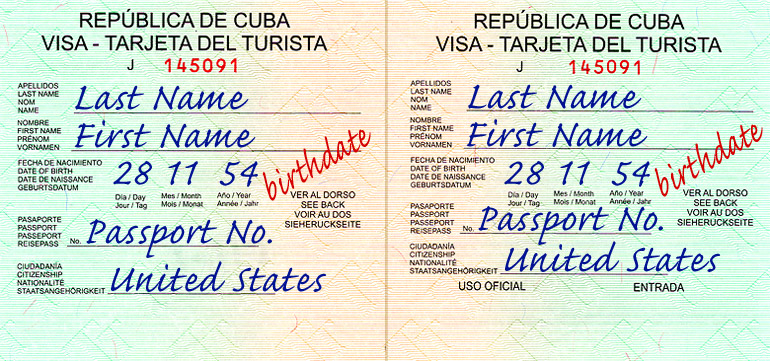Planning to visit Cuba? Before packing your bags, it’s important to understand the Cuba visa and entry requirements. Most travelers need a Tourist Card — known locally as the Tarjeta del Turista — to enter the country. This guide covers visa types, requirements, and practical tips to ensure your arrival in Cuba is smooth and stress-free.

Do You Need a Visa to Enter Cuba?
Almost all foreign visitors require a Cuban Tourist Card before traveling. However, a few nationalities are exempt for short stays. The card functions like a visa and must be presented upon arrival and departure.
- Visa-free countries (up to 90 days): Russia, Serbia, Saint Kitts & Nevis, Grenada, and select Caribbean nations.
- Tourist Card required: Citizens from the EU, UK, Canada, Japan, and most other countries.
- Special visas: Required for journalists, business travelers, and students.
How to Get the Cuban Tourist Card
You can obtain the Tourist Card through several channels depending on your country of departure:
- From your airline or travel agency when purchasing your flight ticket.
- At the Cuban consulate or embassy in your home country.
- Via approved online visa services that mail the card to you before your trip.
The Tourist Card is a small green or pink paper form — do not lose it, as you must present it again when leaving Cuba.
Visa Requirements & Documents
To apply for the Cuban Tourist Card, you’ll need:
- A valid passport (minimum 6 months validity after entry)
- Round-trip or onward flight ticket
- Proof of accommodation (hotel booking or private stay)
- Travel health insurance (mandatory for all travelers)
- Visa fee payment (usually USD 25–50, depending on issuing location)
Applications can typically be completed within a few days. Those entering from the United States should read the next section carefully, as additional restrictions apply.
Traveling to Cuba from the United States
U.S. citizens and residents are subject to special regulations due to ongoing embargo policies. While tourism is restricted, travel is still possible under specific categories approved by the U.S. Department of the Treasury’s Office of Foreign Assets Control (OFAC).
- Allowed categories: family visits, educational programs, professional research, humanitarian projects, and support for the Cuban people.
- Travelers must complete a self-certification form and retain records for 5 years.
- U.S. credit/debit cards generally do not work in Cuba — bring cash.
Flights from the U.S. typically require the pink Tourist Card (different from the green one used by other countries).
Length of Stay & Extensions
The standard Tourist Card allows a stay of up to 30 days for most visitors (90 days for Canadians). It can usually be extended once for the same duration at local immigration offices or hotels authorized to handle visa extensions.
- Extension fee: around 25 USD
- Where to extend: Immigration offices in Havana, Varadero, Trinidad, and Santiago de Cuba
- Documents required: passport, original tourist card, proof of accommodation, proof of travel insurance
Health Insurance Requirement
Travel health insurance is mandatory for all visitors to Cuba. You may be asked to show proof of coverage at immigration. If you don’t have valid insurance, you’ll need to purchase local coverage at the airport upon arrival.
- Minimum coverage: emergency medical and repatriation services
- Local provider: ASISTUR (state-run travel insurance company)
Entry & Customs Rules
Cuban customs are generally straightforward but have a few key restrictions.
- Declare electronic items or large quantities of camera gear when entering.
- Medicines for personal use are allowed, but prescription drugs should be declared.
- Exporting art, antiques, or protected wildlife products is prohibited without permits.
Visitors should also keep the entry form given upon arrival — it will be collected when you depart.
At the Airport
Immigration procedures in Cuba are generally quick and friendly. Expect your passport and Tourist Card to be stamped separately. Photography is prohibited at customs checkpoints, and mobile data may be limited until you connect to a local SIM or Wi-Fi network.

Special Entry Notes
- Visitors entering from countries with yellow fever risk must show a vaccination certificate.
- Minors traveling alone require notarized parental authorization.
- Dual citizens (Cuban and foreign) may face additional immigration checks.
Departure Tax
Cuba once required a departure tax, but it’s now included in most airline tickets. Confirm with your airline to avoid surprises at the airport.
Where to Get More Information
- Embassy of Cuba – consult for the latest visa updates.
- Official tourism site: www.cubatravel.cu
- Contact Information for Cuba – local embassies, emergency numbers, and consular offices.
Where to Go Next
- Cuba Travel Tips – practical guidance for first-time visitors.
- Transportation Guide for Cuba – how to reach top destinations once you arrive.
- Cuba Money – understand currency, payments, and cash handling.
Understanding Cuba’s visa and entry process will save time and ensure a stress-free start to your adventure. Prepare your documents in advance, bring the right Tourist Card, and keep copies of everything — so you can focus on exploring the rhythm, history, and color that make Cuba unforgettable.
